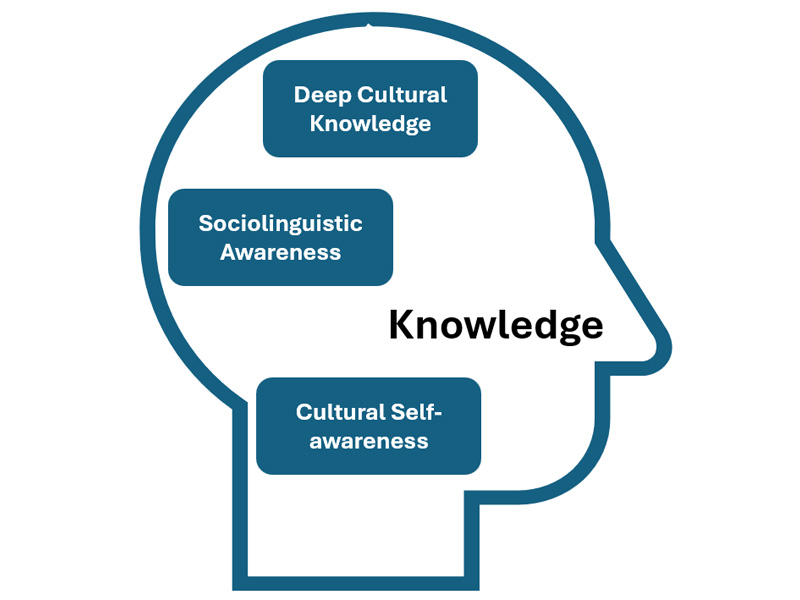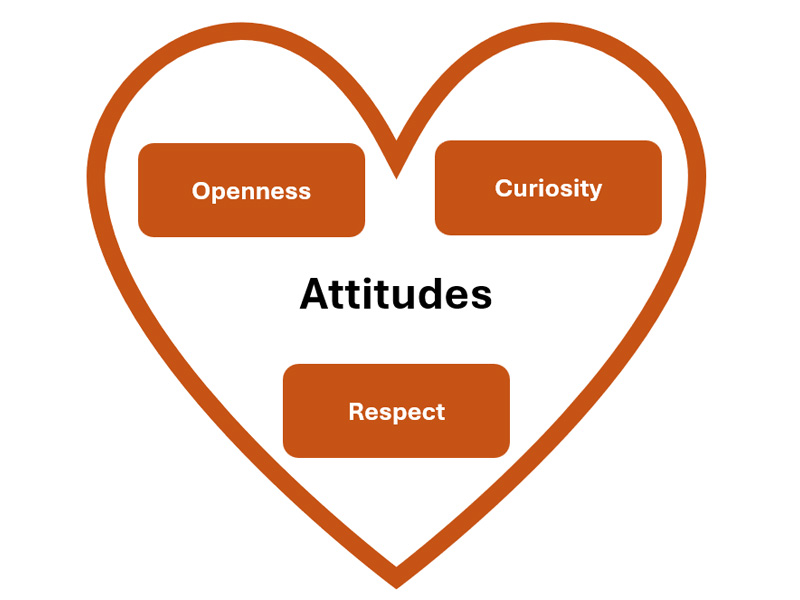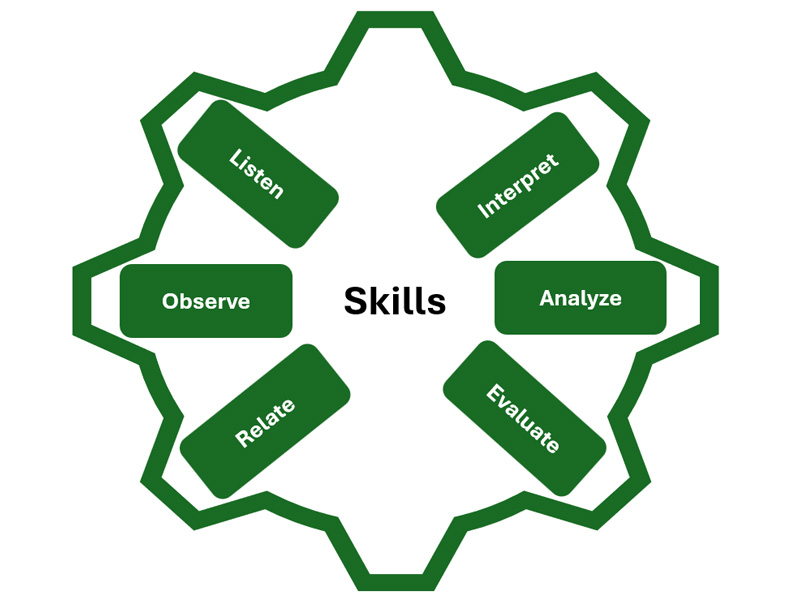
Turning Your Experience into Intercultural Competency
Intercultural competence has been defined in a variety of ways. Hammer (2012) defines it as:
“The capability to shift cultural perspective and adapt behavior to bridge cultural difference.”
This definition might resonate with your experiences abroad, where you probably had to adapt and shift your perspective to understand local norms and function and communicate in new ways. But you’ll also know that it’s not that easy; developing competency in another culture is a process, it takes time, and it requires a variety of skills to be successful.
For this reason, it may be helpful to consider Deardorff’s Process Model of Intercultural Competency Development [1] which depicts intercultural competency development as a continual process requiring specific knowledge, attitudes and skills to successfully adapt to intercultural situations. Note that one of the essential knowledge elements is cultural self-awareness, which we covered in the previous section when we asked you to reflect on your social/cultural identity.
Building intercultural competency also requires some deep knowledge of the other culture(s) and knowledge of how language and culture connect. For example, even if the local language is the same as yours, there will still be differences in terms and usage that give hints about cultural norms. Think about how English is used differently around the world. In Japan, when English is used, it is probably more formal in tone than you might be used to in Canada and reflects the sense of hierarchy and respect often present in Japanese society.
Knowledge, Skills, and Attitudes: How Intercultural Competency Development Happens
Figure 1.3 below highlights the knowledge that influences our intercultural competency development. These precursors include deep cultural knowledge, sociolinguistics awareness, and cultural self-awareness.

Figure 1.3: Knowledge that Influences Intercultural Competency Development
Certain attitudes are also essential to building intercultural knowledge and skills. As highlighted in Figure 1.4 below, openness, curiosity, and respect are qualities that allow you to explore other ways of being in the world without judgment. These attitudes allow you to engage with difference and learn from it without immediately defaulting to your own norms and stereotypes.

Figure 1.4: Attitudes that Influence Intercultural Competency Development
Certain skills are also required to develop your intercultural competency. As highlighted in Figure 1.5 below, the ability to listen, observe, interpret, analyze, evaluate, and relate information are all skills that help you take in cultural knowledge, and create new understandings of yourself and others to continue to build your intercultural competency. Note that these are also transferable skills for employment, but we’ll get into that in Chapter 3.

Figure 1.5: Skills that Influence Intercultural Competency Development
The interaction of these skills, attitudes, and knowledge in the presence of difference, is a process that repeats itself in a cycle that continues your intercultural development even after you return from your travels abroad. Whenever you encounter difference, your intercultural attitudes, knowledge, and skills will help you to learn about and understand the perspectives and motivations of others.
As Deardorff notes, knowledge, skills, and attitudes can lead to appropriate interactions (based on adaptability, flexibility, ethno-relative views, and empathy) which can further develop effective and appropriate communication during intercultural interactions. To see how the process of intercultural competency development works, watch the following video.
Video transcript:
When you begin to develop your intercultural competency, you start with some cultural knowledge (meaning, you know something about the culture you are in), attitudes (such as respect, curiosity and openness) and skills like the ability to listen, observe, reflect and evaluate, among others.
When you interact with people who are different from you, you learn and your cultural knowledge, attitudes and skills improve and grow.
Internally, you gain empathy, adaptability, flexibility and increasingly ethno-relative views (which means you can see things from a cultural perspective other than your own).
Your new and improved intercultural competency is demonstrated by the fact that you behave and communicate in ways that are culturally appropriate for the situation you are in.
And then the cycle repeats.
You start with the knowledge, attitudes and skills you’ve already developed. Interact with people who are different from you, and your already established knowledge, attitudes and skills continue to develop and grow.
You gain increased empathy, adaptability and flexibility and continue to develop your ability to see things from a cultural perspective that is not your own.
You demonstrate your improved intercultural competence by communicating and behaving effectively in intercultural situations.
It’s a process.
As you highlighted in the above video, when you have the knowledge, attitudes and skills and encounter a new situation, your cultural knowledge, curiosity, respect, and openness can combine to increase your cultural understanding. The benefits to you can be internal, such as increased empathy, flexibility, adaptability, and ethno-relative views (the ability to see things from a cultural perspective other than your own), or external, such as effective and appropriate communication and behaviour in an intercultural situation.
Learning Activity: Developing Your Intercultural Competency
Let’s explore the impact of your international experience by reflecting on your intercultural attitudes, knowledge, and skills.
Using the following prompts to guide you, take some time to reflect on your own intercultural competency.
- What happened during your international learning experience? Think about Deardorff’s Model of Intercultural Competence. What stands out regarding your knowledge, attitudes and skills? Are there specific times abroad when you can easily recall demonstrating some of these? Are there some aspects you could have improved upon?
- Why do you think this happened? Reflect on what you think you were effective or ineffective at building your intercultural competence.
- What did you learn? Reflect on what aspects of intercultural competence you developed and what you learned from your mistakes.
- How will you apply this learning in the future? Take some time to brainstorm how you will use your intercultural competencies skills now that you have returned from abroad. How can you continue to improve your intercultural competence?
- Deardorff, D. K. (2006). The identification and assessment of intercultural competence as a student outcome of internationalization at institutions of higher education in the United States. Journal of Studies in International Education, 20(3), pp. 241–266. ↵

